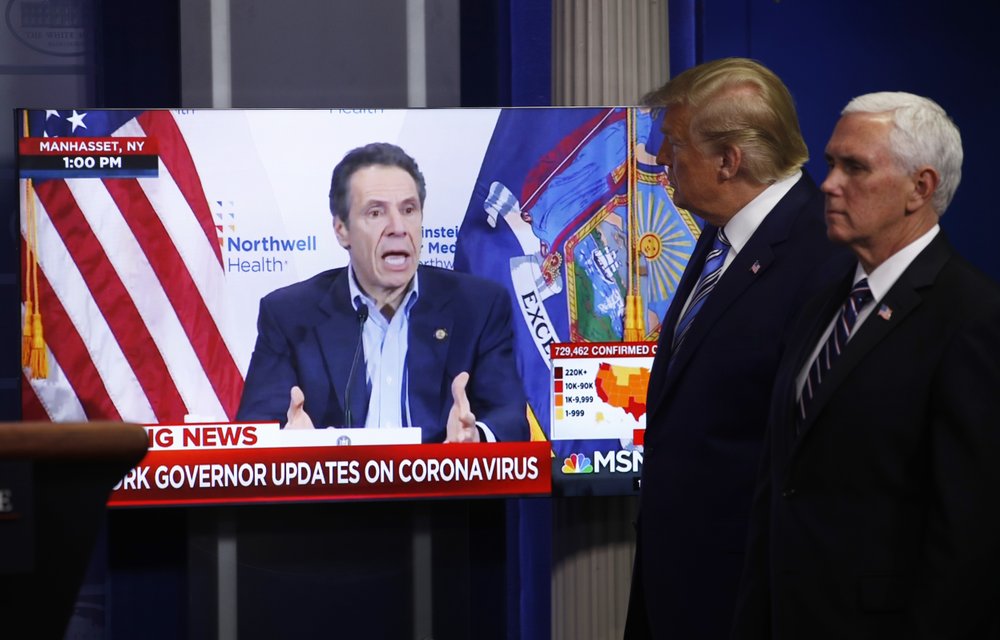Forget performing William Shakespeare’s Macbeth. The real art form is politicking. They sport taxpayer-funded windbreakers, speak with authority and urgency, and lead a brigade of specialists. When a crisis unfolds, whether it is a hurricane or a virus outbreak, politicians stand before the cameras, appearing to be in control of the situation—but they see an opportunity. As the catastrophe intensifies, the public recoils in fear and cowers before their dear leaders, amid uncertainty and upheaval. Does being a master performer transform a politician into an apotheosis?
The Deification of Politicians
Governors and mayors have been on top of the emergency response to the coronavirus pandemic since the very first confirmed cases were reported in their jurisdictions. With furrowed brows and a quiver in their voices, these public officials regularly speak in earnest before the press, informing their constituents that they will do whatever they can to ensure your grandmother stays safe at this unprecedented time. And that includes violating your constitutional rights.
Like Hamlet with Yorick’s skull, politicians can now take advantage of props to further enhance their performance and add to the gripping saga. Due to the highly infectious nature of this respiratory illness, face masks and gloves complement their tremendous acting in front of activists pretending to be journalists.
As we gaze upon our television screens or computer monitors, we become even giddier when politicians park their partisanship at the door and applaud everybody regardless of the letter next to their name. If California governor Gavin Newsom or New York governor Andrew Cuomo praises President Donald Trump for his cooperation rather than participating in petulant and partisan bickering, they must mean business. This is the cherry on top that can help them secure their version of the Academy Award: reelection. Or, if they are not seeking another two or four years in the position, then their micromanaging can elevate their status in the political arena.
The chief bureaucrats’ showmanship in the coronapocalypse or a natural disaster can produce the nation’s next president or god-emperor. Of course, this cannot be done without members of the press. Over the years, politicians have taken full advantage of the media to highlight their management abilities in a disaster zone. For some, it has lifted their polling numbers. For others, it destroyed their future electoral hopes and dreams.
President Trump’s approval rating for his handling of COVID-19 had been climbing among independents and undecided voters for weeks. Although the polling bump appears to be over, the spike in the polling data suggests the power of the phrase “never let a crisis go to waste.”
After an administration plagued by scandals and incompetence seemed to be on the precipice of the abyss, Governor Cuomo turned his sinking ship around in a couple of weeks and became America’s governor. A presidential bid in the future? No matter what, he will certainly not say goodbye to politics once he exits Albany.
Governor Chris Christie thought he could substitute stairs for an escalator to the White House in 2016 for his leadership throughout the Hurricane Sandy tale. He used all the typical props for officials during a calamity: the windbreaker, the urgency, and the cordiality with individuals on the other side of the aisle. It turned out that his hugs and camaraderie with then president Barack Obama, who also donned the windbreaker, were a bit too much for primary voters to endure.
Do politicians act based on an opportunistic endeavor to secure additional time in office or to land a promotion elsewhere in public life? The cynic will nod his or her head, while the optimist will say no. Either way, presidents, governors, and mayors use crises to advance their careers.
Love Thy Politician
Politicians tap into their mawkish reserves when they witness scores of deaths or communities destroyed by an enemy—seen or unseen. Should this be viewed as emotional intelligence or political strategizing? The purpose of practical politics is to connect with your fellow man, showing that the average person could have a beer with the guy or gal in charge. Anytime a president or a state official is photographed consoling a crying citizen, the picture screams a thousand words that campaign strategists exploit.
As H.L. Mencken wrote in 1919: “The public demands certainties.” That is why even some of the most strident critics of the state run into the arms of politicians—Republican or Democrat, progressive or conservative—when the occasion arises. Our love of autonomy from the state is mostly imaginary when uncertainty develops, and this is how you end up with an erosion of freedoms and liberties that will never be reinstated when normalcy returns.
Be it a terrorist attack or a virus outbreak, we heed the politicians and beg them to take care of the problem. We want to be left alone to our Netflix binging, to our celebrity worshiping, and our debating over the superiority of the Nile River to the Amazon River. By the time the next crisis strikes the nation, politicians consolidate their power and feast on your rights, shipping you off to a claustrophobic solitary confinement cell in the heart of the Swamp.





